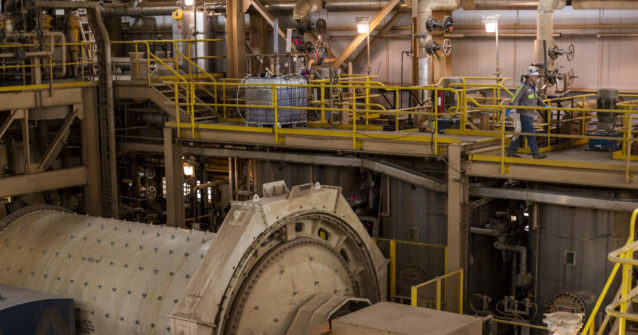The U.S. government announced a $1.4 billion partnership Monday with Vulcan Elements and ReElement Technologies to build a domestic rare-earth magnet supply chain, marking one of the Trump administration’s most significant investments in reducing America’s dependence on Chinese critical minerals.
The deal includes a $620 million direct loan from the Department of War’s Office of Strategic Capital to North Carolina–based Vulcan Elements, which will build and operate a facility capable of producing 10,000 metric tons of magnets annually in the United States. The Commerce Department will provide $50 million in incentives under the CHIPS and Science Act for equipment purchases, according to the department.
Private investors are contributing another $550 million to the Vulcan project, while ReElement Technologies, which processes and recycles rare-earth materials, will receive $160 million in combined federal and private funding.
In return, the Commerce Department will receive $50 million in equity in Vulcan Elements, and the Department of War will receive warrants in both companies, granting it the right to buy shares at a preset price. The arrangement is outlined in a preliminary, non-binding letter of intent.
“Our investment in Vulcan Elements will accelerate U.S. production of rare-earth magnets for American manufacturers,” Commerce Secretary Howard Lutnick said in a statement released by Vulcan Elements. “We are laser-focused on bringing critical mineral and rare-earth manufacturing back home, ensuring America’s supply chain is strong, secure, and perfectly reliable.”
Rare-earth magnets are essential components in AI data centers, electric vehicles, consumer electronics, and military systems including missiles, drones, satellites, and jet fighters. China has long dominated the global supply chain, controlling everything from mining to processing and manufacturing.
The deal follows Beijing’s export restrictions on rare earths and critical minerals imposed late last year and expanded in April to include rare-earth magnets themselves. The curbs forced U.S. manufacturers and defense contractors to seek alternative suppliers, with Chinese exporters required to prove their shipments weren’t being used in defense applications.
China rolled back some restrictions after trade talks between President Trump and Xi Jinping last week. Trump said the dispute over rare earths “has been settled.”
The announcement represents a major boost for Vulcan Elements, led by former Navy officer John Maslin, which unveiled its first commercial manufacturing facility in March and raised $65 million in venture capital this summer.
“As a former Navy officer, I am honored by the trust that the American government and American people have placed in Vulcan Elements,” Maslin said. “Now more than ever, we remain focused on execution and performance so that we can deliver a capability the nation urgently needs.”
The partnership builds on an August agreement between Vulcan Elements and ReElement Technologies for a commercial-scale supply of rare-earth oxides. ReElement processes end-of-life magnets, electronic waste, and mined concentrates into high-purity oxides, which Vulcan converts into metals and finished magnets. Together, they aim to create what the companies describe as a “100 percent vertically integrated, domestic magnet supply chain.”
“ReElement Technologies and Vulcan Elements are natural partners,” said ReElement CEO Mark Jensen. “With support from the United States government, we are positioned to become a solution that secures America’s fundamental supply chains.”
The deal follows a pattern of the Trump administration taking equity stakes in companies building strategic technologies. In July, the Department of War acquired a 15 percent stake in MP Materials, the nation’s largest rare-earth miner. In August, the government took a 10 percent stake in Intel, and it also secured a 15 percent share of Nvidia and AMD’s China sales under recent export-control settlements.
The companies said they are in ongoing discussions with the Office of Strategic Capital and the Commerce Department’s CHIPS Program Office to finalize diligence requirements. As of Monday, the Department of War had not released its own statement on the arrangement.

















